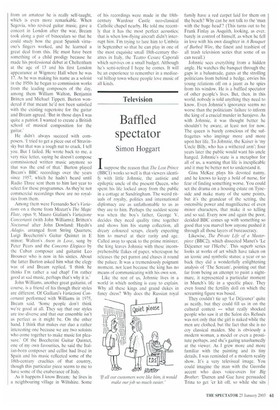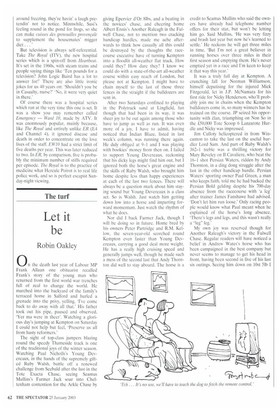Baffled spectator
Simon Hoggart
Isuppose the reason that The Lost Prince (BBC1) works so well is that viewers identify with little Johnnie, the autistic and epileptic uncle of the present Queen, who spent his life locked away from the public in a cottage at Sandringham. The weird rituals of royalty, politics and international diplomacy are as unfathomable to us as they are to him. Perhaps the saddest scene was when the boy's father, George V, decides they need quality time together and shows him his stamp collection, all dreary coloured scraps, clearly expecting him to marvel at their rarity and age. Called away to speak to the prime minister, the king leaves Johnnie with these incomprehensible flakes of paper, whereupon he releases the pet parrot and chases it round the palace. It was a tremendously poignant moment, not least because the king has no means of communicating with his own son.
Like the rest of us, Johnnie lives in a world in which nothing is easy to explain. Why all these kings and grand dukes in fancy dress? Why does the Russian royal family have a red carpet laid for them on the beach? Why can he not talk to the 'man with the huge head'? (This turns out to be Frank Finlay as Asquith, looking, as ever, barely in control of himself, as when he fell in love with his own daughter in A Bouquet of Barbed Wire, the finest and trashiest of all trash television series that some of us can recall.) Johnnie sees everything from a hidden angle. He watches the banquet through the gaps in a balustrade, gazes at the strolling politicians from behind a hedge, envies his young relations off on a jaunt as he spies from his window. He is a baffled spectator of other people's lives, But, then, in this world, nobody is told anything they need to know. Even Johnnie's ignorance seems no worse than the politicians' failure to inform the king of a crucial murder in Sarajevo. As with Johnnie, it was thought better he shouldn't be aware, at least not for now. The queen is barely conscious of the suffragettes who impinge more and more upon her life. To Johnnie, the Kaiser is 'my Uncle Billy, who has a withered arm'; four years later the public would want his uncle hanged. Johnnie's state is a metaphor for all of us, a warning that life is inexplicable and it may be better not to understand it.
Gina McKee plays his devoted nanny, and he knows to keep a hold of nurse, for fear of finding something worse. You could set the drama on a housing estate on Tyneside and make many of the same points, but it's the grandeur of the setting, the ostensible power and magnificence of even minor characters, that make it so telling and so sad. Every now and again the poor, derided BBC comes up with something so good that you marvel how anyone pushed it through all those layers of bureaucracy.
Likewise, The Private Life of a Masterpiece (BBC2), which dissected Manet's 'Le Dejeuner sur l'Herbe'. This superb series looks at works of art which have taken on an iconic and symbolic status; a year or so back they did a wonderfully enlightening analysis of The Scream', pointing out that far from being an attempt to paint a nightmare, it represented a particular moment in Munch's life in a specific place. They even found the fertility doll on which the screaming figure was based.
They couldn't tie up 'Le Dejeuner' quite as neatly, but they could fill us in on the cultural context — what really shocked people who saw it at the Salon des Refuses was not only that the girl is naked while the men are clothed, but the fact that she is no coy classical maiden. She is obviously a modern woman, a model or even a prostitute perhaps, and she's gazing unashamedly at the viewer, As I grew more and more familiar with the painting and its tiny details. I was reminded of a modern reality show. It's a very televisual image. You could imagine the man with the Geordie accent who does voice-overs for Big Brother: 'Darren and Gaz have persuaded Trina to get 'er kit off, so while she sits around freezing, they're havin' a laugh pretendin' not to notice. Minnwhile, Susi's feeling round in the pond for frogs, so she can make cuisses des grenouilles provencale to supplement the housemates' migger diet,,.'
But television is always self-referential. Take The Royal (ITV), the new hospital series which is a spin-off from Heartbeat. It's set in the 1960s, with steam trains and people saying things like 'Ten pounds for a television? John Logie Baird has a lot to answer for!' There are also little ironic jokes for us 40 years on: 'Shouldn't you be in Casualty, nurse?"No, it were very quiet in there.'
Of course there was a hospital series which ran at the very time this one is set. It was a show you may remember called Emergency — Ward 10, made by ATV. It was enormously popular, mainly because, like The Royal and entirely unlike ER (E4 and Channel 4), it ignored disease and death in order to concentrate on the love lives of the staff. EW10 had a strict limit of five deaths per year. This was later reduced to two. In ER, by comparison, five is probably the minimum number of stiffs required per episode. The Royal is to the practice of medicine what Hercule Poirot is to real life police work, and so is perfect escapist Sundav-night viewing.



















































































 Previous page
Previous page